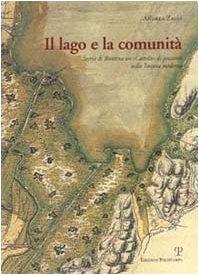Zagli, Andrea. Il lago e la comunità: Storia di Bientina un “castello” di pescatori nella Toscana moderna [The Lake and the Community: History of Bientina, a Fishermen’s “Castle” in Modern Tuscany]. Firenze, It.: Edizioni Polistampa, 2001. The Bientina Lake was a lake-swamp situated across the border between the states of Florence and Lucca. Hunting, fishing, and gathering were the economic activities of this area (besides, obviously, some agriculture). The complexity of the environment, adapted to different uses and also to different visions (from the lake as a resource for the fishermen to the lake as an obstacle for the farmers), had many consequences for its history. First of all, there were conflicts among the different users of the swamp area—in many cases, the reasons for the conflicts were to some degree ecological. For instance, problems about the kinds of nets used by different groups of fishermen were created by the ecological consequences of each—some technological options threatened both the ecological and social equilibrium. The environmental history goes together with the socio-economic history while the book tries to understand why there have been so many different technologies employed by groups of users who were not far distant from each other. In this case, the fishermen from Bientina were fishermen only, while the others from Lucca were not so specialized—they were fishermen occasionally, while they also had other employment. Thus, we can understand why those from Lucca used forbidden nets more than the inhabitants of Bientina. Another big problem with fishery rights was the network of water ways in the lake that was very important for both men and for fish. Opening or closing a canal could generate many disputes. In the background is the question of common property, the theoretical universe of the community, and equally, the methodological approach for understanding this story. Zagli analyzes the forms of access to the common resources (based on the rule of citizenship, i.e., to belong to the community), explaining at the end of the book the resistance of the community to the change from a common property regime to a private property one. (Text adapted from an H-Net review by Marco Armiero.)
Il lago e la comunità: Storia di Bientina un "castello" di pescatori nella Toscana moderna
Zagli, Andrea | from Multimedia Library Collection:
Books & Profiles


